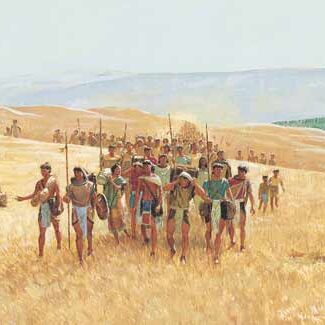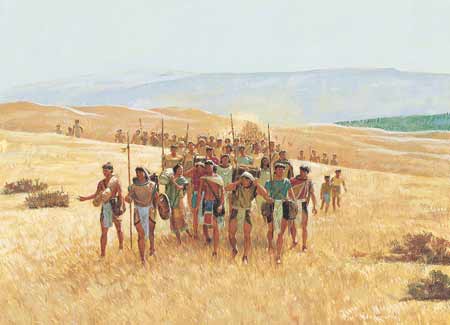Background: 63 BC
Captain Moroni, Teancum and Lehi lured the Lamanites out of the city of Mulek and surround them outside the city of Bountiful (Alma 52:19-31). There was a fierce battle between them and many Lamanties and Nephites died. In the end, the Lamanites finally surrendered and many of them were taken prisoner (Alma 52:31-40). They were marched to the land of Bountiful where they were made to work building fortifications for the city (Alma 53: 1-6). After this battle Moroni rested from fighting for the rest of the year in order to increase the Nephites fortifications and to take care of their women and children (Alma 53:7).
Facts about them:
- Many of them lost husbands, sons, fathers, and brothers during the battle between the Nephites and the Lamanties that took place outside of the city of Bountiful (Alma 52:31-40);
- They were suffering from famine and affliction (Alma 53:7) ;
- Moroni commanded his men to take a break from battling with the Lamanites in order to take care of them and provide them with food (Alma 53:7). ;
- Their city was filled with Lamanite prisoners (Alma 53: 1-6);
- They were among the women included in the title of liberty raised by Captain Moroni, which said that the Nephites would take up arms, “In memory of our God, our religion, and freedom, and our peace, our wives, and our children“ (Alma 46:12).
- They were probably starving from famine because they were unable to successfully plant or harvest crops while their men were at battle;
- The affliction mentioned might have been some sort of disease– or just the fact that they were starving to death;
- They probably had to help take care of the Lamanite prisoners, perhaps providing food or clothing for them.
My thoughts:
In the “war chapters” of Alma we don’t hear a lot about the women who were left behind, or how the war affected them or their children. In all the “glamour” and “glitz” of war and battle we often forget that despite the fact that the world was falling apart around them, they still had to find a way to hold things together. Amidst all the ruin and the destruction these women had to find a way to bear and raise children, provide food, clothing and shelter for their families, and take care of the sick and aging. Their responsibilities didn’t stop because of war or because their husbands were dead or gone to battle. They still had to carry on and find a way to bring hope to the next generation, despite the darkness that encompasses them.
I think it is beautiful that in Alma 53:7 we get a very little glimpse into what these women must have been suffering while their men were at war. We read that after the battle outside of Bountiful, Moroni “…did no more attempt a battle with the Lamanites in that year” but instead took the time to fortify the city and to deliver “their women and children from famine and affliction”. Here we see that not only did these women loose husbands, sons, fathers, and brothers to battle but they were also starving and afflicted, perhaps even with disease of some sort. We don’t know much more about them than that, but I think it was inspiration from God that made Moroni commanded his men to take a break and focus on providing and caring for their wives and children. I think it just shows that God was aware of these women and what they were going through, and He found a way to take care of them even amidst battles and bloodshed. It is just a testimony to me that even in the darkest and hardest of circumstances, God never forgets about the women.
Questions to Think About:
- It seems that women are always the one who suffer the most from war. They are the ones who are left behind, without husbands, to raise and provide for children by themselves and to find a way to continue life. They also suffer misappropriate amounts of abuse when captured or conquered in the form of rape, slavery, and exploitation. Why does this happen? Why do women suffer more when they aren’t the ones who start the wars? Why does God allow it?
- How did these women manage to raise righteous children amidst so much battle and bloodshed?
- How are their trials similar to the spiritual battles we must face today?





